#Higgins x Eliza
Explore tagged Tumblr posts
Text

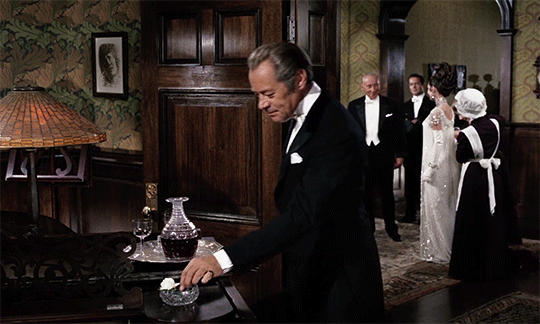

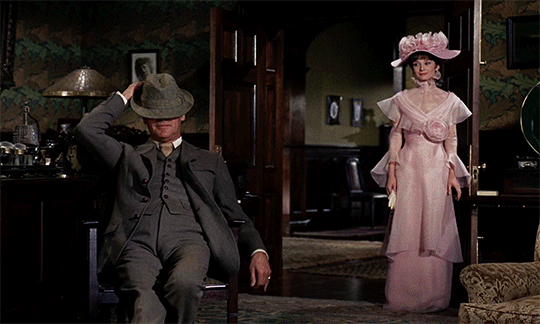
Higgins + learning to accept Eliza flowers in his life.
#My Fair Lady#My Fair Lady 1964#Henry Higgins#Higgins#Eliza Doolittle#Rex Harrison#Audrey Hepburn#myfairladyedit#mfledit#filmedit#musicaledit#moviemusicaledit#pureanonedits#henryhigginsedit#elizadoolittleedit#Higgins x Eliza#Eliza x Higgins#this movie is SO#She doesn't wear flowers again until she LEAVES HIM#and then she comes back into his space with this GIANT flowery hat and flouncy outfit#she comes into his space again in HER element#no longer is she dressed to fade into the background of his house!!#She's making it her own!!#For him and her!!#and it is so!!!
211 notes
·
View notes
Photo



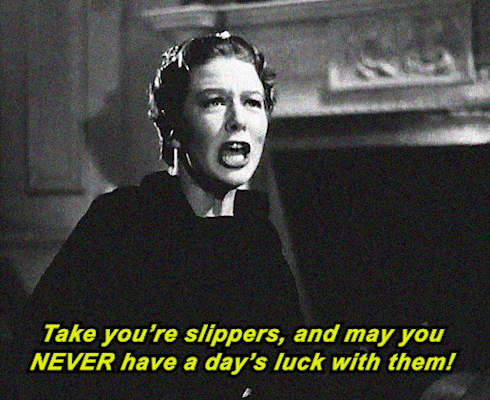
What’s the matter? Anything wrong?
WENDY HILLER and LESLIE HOWARD in BERNARD SHAW’S PYGMALION (1938) | dir. ANTHONY ASQUITH
#pygmalion#bernard shaw#my fair lady#classic film source#filmgifs#british cinema#filmblr#classicfilmblr#classicfilmedit#leslie howard#wendy hiller#1930's cinema#circa 1938#1938 films#professor henry higgins#eliza doolittle#henry x eliza#period drama#drama edit
144 notes
·
View notes
Text
#lerner and loewe#musical theatre#broadway musicals#my fair lady#brigadoon#gigi#camelot#musicals#alan jay lerner#frederick loewe#camelot musical#musical polls#theatre polls#musical theater fandom#show tunes#love songs#broadway shows#movie musicals#1950s movies#musical film#henry higgins#eliza doolittle#guinevere#lancelot#guinevere x lancelot#sir lancelot#queen guinevere#julie andrews#leslie caron#robert goulet
6 notes
·
View notes
Link
Chapters: 1/1 Fandom: My Fair Lady (1964) Rating: General Audiences Warnings: No Archive Warnings Apply Relationships: Eliza Doolittle/Henry Higgins/Hugh Pickering, Eliza Doolittle/Henry Higgins, Henry Higgins/Hugh Pickering Characters: Eliza Doolittle, Henry Higgins (My Fair Lady | Pygmalion), Hugh Pickering Additional Tags: Post-Canon, Getting Together, Marriage of Convenience, Pre-Poly, Pining, Oblivious, in which Henry Higgins has a bi awakening Summary:
“If I am to stay here,” Eliza announced over breakfast, on the morning after her return to Wimpole Street, “then one or the other of you will have to marry me. It isn’t respectable otherwise.”
3 notes
·
View notes
Text
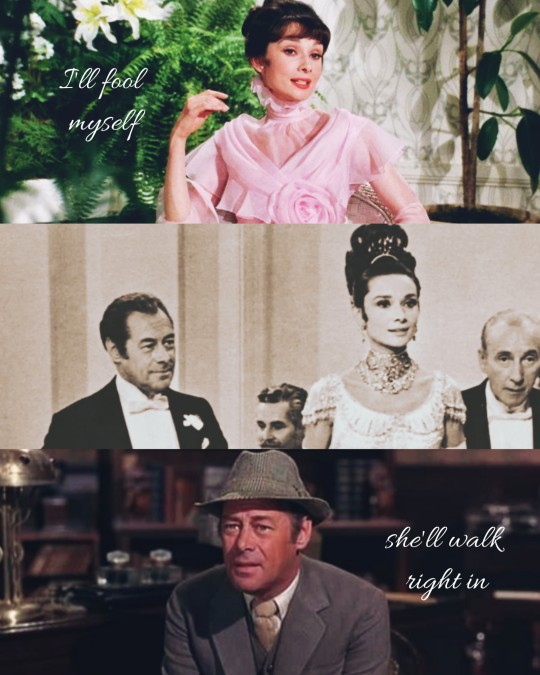
And be with me for evermore
#eliza doolittle x henry higgins#eliza x henry#audrey hepburn#rex harrison#my fair lady 1964#my fair lady#evermore
8 notes
·
View notes
Text
From the Ashes Infinity Comics #15: Pygmalion, Part 1
So, for those who are not aware - Infinity Comics are online-only comics distributed through Marvel Unlimited, their subscription based app and browser collection of comics. Regarded as 'inessential,' but still very much canon, the raft of Infinity Comics coming out of From the Ashes have been quite good, but I haven't seen fit to comment on them for a bit, until now, because . . .
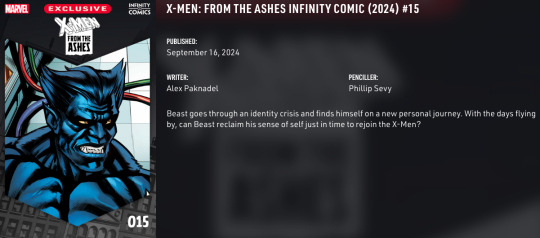
Let's go.
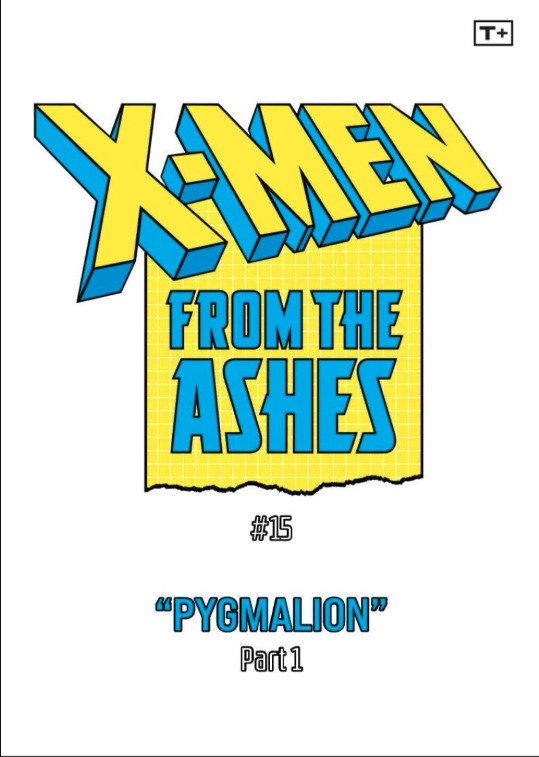
For those not aware, Pygmalion is a famous novel by George Bernard Shaw, detailing the attempt by a phonetics professor called Henry Higgins to 'elevate' a Cockney flower-girl named Eliza Doolittle.
Intrigued by a bet that he could pass her off as a duchess through careful schooling, he decides to take her on, and though he succeeds, she ends up feeling marginalised and overlooked, treated as an object of gambling and curiosity rather than an individual in her own right, and though the play is best known for the 'culturing' of Eliza Doolittle, it is as much about the arrogance of Higgins, who is a thoroughly unpleasant and rude individual, in thinking that he has any ownership over Eliza for his education of her. He may have 'created' her, but he does not control her.


The Factory that the X-Men are living in at present must have really good central heating for Cyclops to be wearing basketball shorts and a crop top that short.
Beast is currently investigating some kind of issue with Magneto's chromosomes - to put it succinctly, he appears to be ageing rapidly, and does not have access to his X-gene at present. This is a continuation of the storyline in the previous Infinity arc, which focused on Magneto.

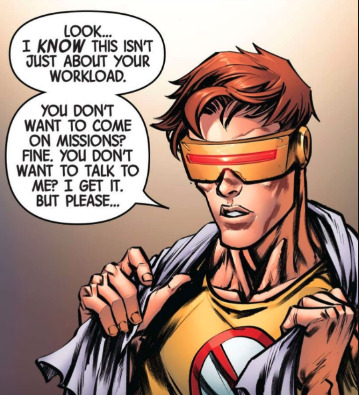

Something worth noting - this is the first acknowledgement of the fact that though Hank's body may be of roughly the same physical age as his original, his mind is considerably younger, situated at some point in his mid 20s. For someone who was always the oldest of the original X-Men, this is fairly significant.
Also worth noting - Hank joins the ranks of superheroes who are actively seeking therapy for their problems! Good on you, Hank! And good on you, too, Scott, for suggesting it. Though, perhaps, given recent developments in the mainline X-Men comics, you should take your own advice . . .
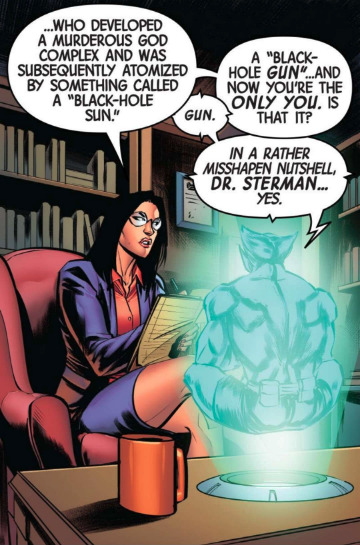

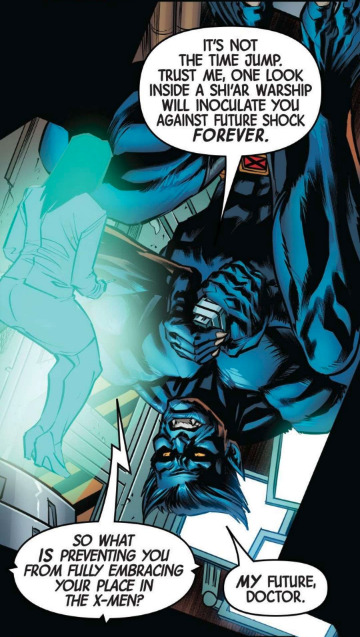
The fact that Hank refers to himself as the only one left seemingly confirms that X-Force took care of the Beast clones who Beast Prime planted around various landmarks as part of the Ghost Calendars arc. Though they were defeated in their respective future timelines, I wasn't quite sure if they had been taken care of in the present as well. This seemingly confirms that they were.
Hank's therapist is Dr. Andrea Sterman, a supporting character from Jed MacKay's Moon Knight run, and a member of the Midnight Mission. Given that the writer, Alex Paknadel, confirmed on Twitter that he talked with Jed MacKay about making sure all the details for Hank's storyline would line up with the mainline X-Men book, I can only imagine this was done as a rather fun continuity nod.
Hank also refers to a Shi'ar warship, an avian alien race that the X-Men deal with on a regular basis. This makes sense, given that Hank was beamed aboard the Shi'ar imperial flagship during the events of Dark Phoenix Saga in 1981 - ancient history for us, but relatively fresh in Hank's mind, given his memories come from 1985.
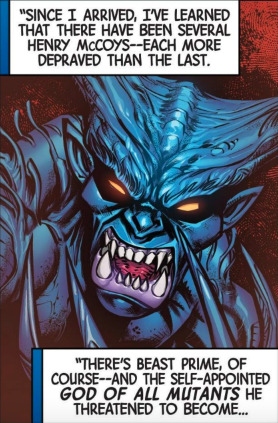


Hank, naturally, does himself a disservice here. Dark Beast was, assumedly, abducted at a relatively young age from his human parents, and indoctrinated by Mister Sinister as something of a protege - a protege living in perpetual fear of his mentor. He probably didn't have a chance to develop any kind of moral code divorced from the social Darwinist hellhole that is the Age of Apocalypse.
That being said, Hank probably lacks that context, and Dark Beast is unique among Age of Apocalypse denizens, not just for his unerringly cruel nature, having never shown any altruistic tendencies (unlike, say, AoA Cyclops or Nightcrawler), but also for his resilience. He persists, even now - though last seen in Immortal X-Men #9 as a head in a jar, he has come back from the dead at least twice before, and it is unlikely he is gone for good.
Fun fact - his appearance here is based on the costume he wore during his scrap with Emma Frost's X-Men team in a confrontation with Spider-Man and the Lizard. Though the X-Men naturally encountered him after this point, it's fun that this appearance by Dark Beast is considered iconic enough to be the 'definitive' look for him by this comic.
Hank's final remark, about 'Henry McCoy plus time equals atrocity,' is a sentiment often repeated on social media boards, and it's interesting to see it being internalised by Hank himself, given his unique perspective on the events that created his future self and the other potential timelines the X-Men files likely refer to.

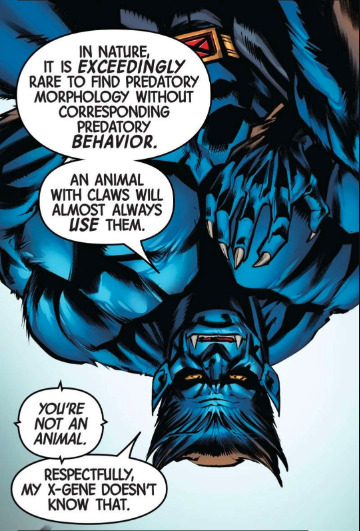
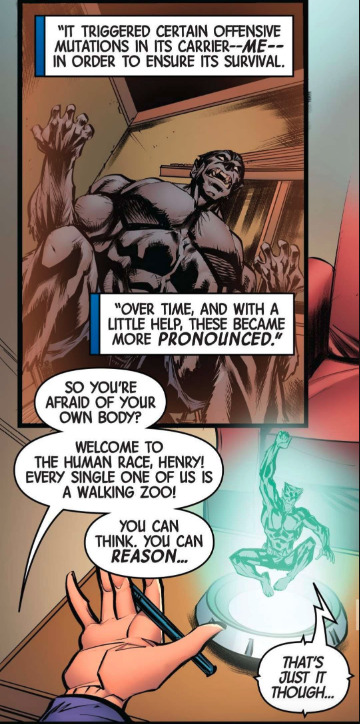
Mm. A lot to unpack here.
Hank's relationship with his X-gene has always been complicated, and the way he views it here, as essentially morphing him into a shape that he finds abhorrent, predatory, and beyond his control, is consistent with how Hank seemed to see himself during his feline mutation, which lasted from 2000 to 2013.
Though his feline phase is not referenced in this comic, beyond the 'over time, and with a little help, these became more pronounced,' (probably a reference to Sage's jumpstarting his secondary mutation) it assumedly would be in the files Hank has been using to catch up, and one has to wonder if he's been repeating some of the thought processes that made feline Hank such a uniquely neurotic version of the character.
It's also nice to see a canonisation of my long held fanon that Hank's X-gene is actively attempting to craft a form for him that is best suited for survival, a belief that Hank only hinted at back in Morrison's New X-Men, but which made sense, given the circumstances of his mutation in X-Treme X-Men.
That being said, Hank's own mind seemingly strays back to the night his furry mutation first manifested at the Brand Corporation in Amazing Adventures, where he flew into a berserker rage and nearly killed Carl Maddicks, which always seemed a little incongruous with how Hank was written in subsequent appearances in Avengers and Defenders, but which now seems to be retroactively made an expression of the brutality he was capable of during his feline phase.

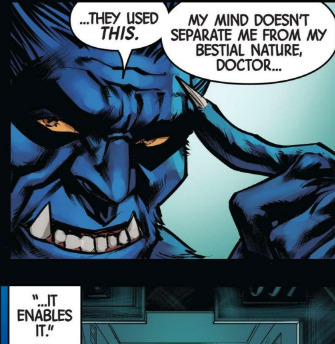
The 'violent upheavals' Hank refers to here are likely his initial secondary mutation, and then his near-death experience when said mutation randomly destabilised in All-New X-Men. It could also be a reference to his numerous genetic troubles during X-Factor volume 1.
His opining that he found refuge in the life of the mind is very reminiscent of Hank's desire to find meaning in poetry, literature, art, humanity, in the wake of the changes in his body in both X-Factor and New X-Men. X-Factor #33 and New X-Men #117 both specifically reference his delight in the freedom to think, in opposition to the clouding of the mind that came with his Pestilence inflicted dumbing down, or his newly awakened predatory impulses.

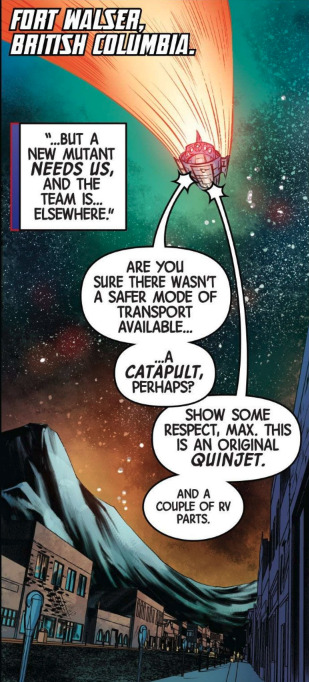
Ironically enough, Magneto is, aside from Simon Williams, the character with whom this version of Hank has shared the most panel time and dialogue, between his conversations in X-Men and previous From the Ashes Infinity Comics. It would appear that Max's need for a cure for his condition are fostering a necessarily stronger bond than Hank and Max have ever shared before in canon.
Precisely where the rest of the team is during the course of these events is unknown. If I had to guess, it's possible this might be set during the events of X-Men #2, where the rest of the team was attending to a mutant rescue in San Francisco, accounting for the lack of availability of the Marauder and a reliance on an old Quinjet.
Quite how Hank got his hands on said Quinjet is unknown, though it's possible it might be a holdover from Hank's Defender days, where he would regularly borrow a Quinjet from the Avengers, for purposes ranging from actual superhero missions to attending Patsy Walker's wedding.
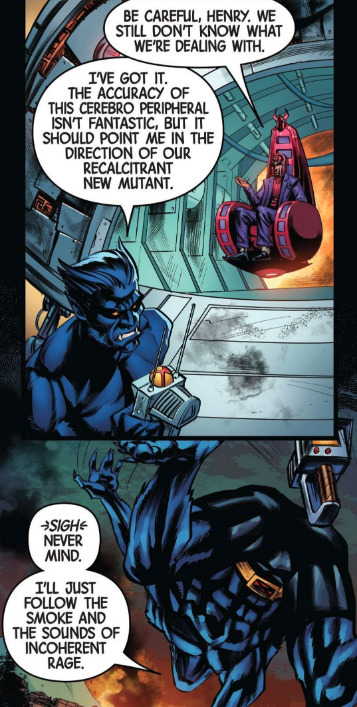
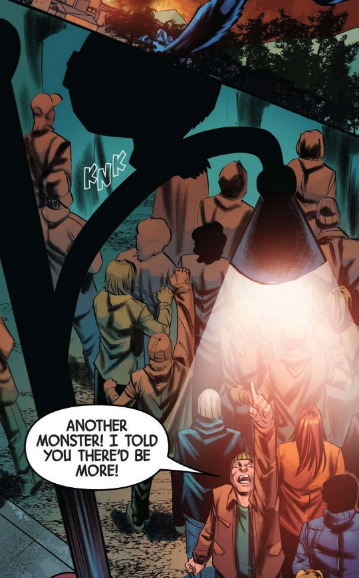

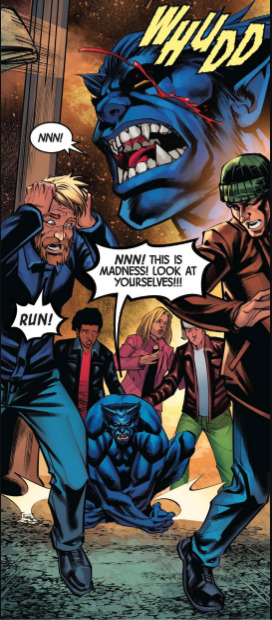
Though this Hank's memories originate in closest proximity to the Defenders, and though that team did enjoy some degree of notoriety under Hank and Candy Southern's stewardship, the Avengers have always been where Hank was most popular in-universe, and he has had a habit of using that association to smooth things over in mutant related books, such as in X-Factor volume 1 and the 90s X-Men run.
Unfortunately, mutant rights are in a more dire state than ever before, with things having seemingly gotten only worse for them since the 1980s, and it's likely Hank didn't expect this level of hatred from normal civilians.

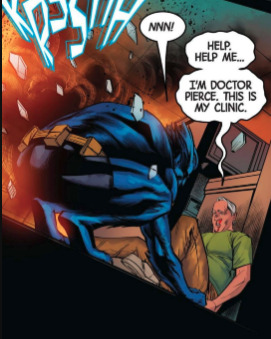
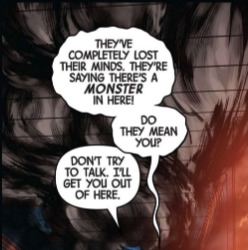

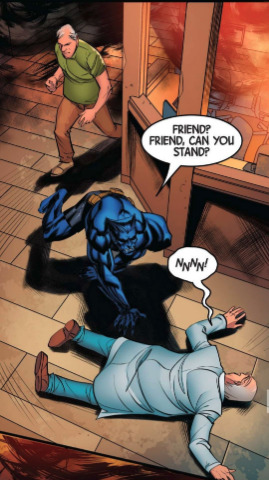
I have, unfortunately, run out of images, so I'll be posting the last of this issue and my final thoughts and predictions in another post.
#outofmuffins#hank mccoy#henry mccoy#max eisenhardt#scott summers#beast x-men#from the ashes#infinity comics
29 notes
·
View notes
Text
Wow, kudos to you for remembering so much about this version: you have actually brought my attention back to many details I'd overlooked!
-I can't remember whether Eliza uses du or Sie when talking to Higgins, but she definitely addresses him by the latter at the end when she's trying to distance herself from him. Only then Higgins answers back in the same manner as a joke, but I *think* he always says du to Eliza. Eliza's dialect is something I can't place either, so I would also wager it's a made up language comprising different regional dialects.
-so that's what Eliza's instrument is! Thank you for specifying! I loved how often and prominently it is featured throughout the movie: even Higgins who seemed to detest it starts playing (with) it at the very end, just as he's accepting Eliza's role in his life. Her song cracked me up at first, but paying attention to the lyrics gives it a whole different (ie creepy) meaning. It's indeed very telling and appropriate for the time period and place this movie was made and indirectly set in. As far as I can tell this version likes to pretend it's set in England, unlike the more creative Dutch film. However, it has so many quintessentially German details about it that they immediately give away the lie. Mrs Higgins' flat being turned into what looks like a villa by the lake is a very glaring one: it just screamed Berlin to me. I'm guessing keeping the original setting was an intentionally superficial choice to divert the audience's attention from what was happening in Germany at the time.
-Higgins playing Schubert and then behaving like a Romantic hero for a bit is an interesting choice. Gründgens absolutely sells the emotionally stunted intellectual who doesn't see love even when it's staring him in the face, so it doesn't feel as jarring as some of Higgins' romantic moments in the Dutch version. IIRC, after his confrontation with Eliza he opens the door to Pick's bedroom (they have connecting rooms?) and starts ranting about how dangerous it is to get involved with a young woman, no matter her social class. Schopenhauer said that women are a joke of nature, so it must be true. Pick is half asleep so he asks Henry what the matter is with Eliza. Higgins answers that she's asking to be taken seriously as a woman. Pick asks why that shocks Henry? He's surprised by her 'sudden' change, since she'd seemed so passive for months. He wants to know out of scientific interest whether this change was brought by his lessons or if Eliza has always been her own woman. Then he starts admiring the night sky and the moon. Pick just leaves him at it.
-Johnny does have a more prominent role in this movie. I thought he looked younger than Eliza (he looked like a teenager to me), so I never picked up love interest vibes from him but I could be wrong. He's definitely fascinated by her transformation when they meet again at the races though, and he offers her an ice cream. There's a man about to go away without paying, and Eliza first jumps a fence and then breaks her umbrella trying to defend Johnny from the thief. I liked how much attention was given to Eliza's old way of life. The movie's apt subtitle being 'Elisa, das Blumenmädchen' really reinforces how Pygmalion is first and foremost Eliza's story.
-the final act is the one with the most changes from the original play! Higgins does start mixing cocktails at some point, but it's during Mrs H's tea party, while Eliza is telling everyone about her aunt. In the final act he just walks around disgruntled and tries to order Eliza to come home. Mrs H berates him and tells him to behave. I loved the moment where Eliza asks him to call her Miss Doolittle and Freddy immediately calls her Eliza. Their confrontation on Mrs H's porch/balcony is much shorter, and Higgins muses that she's turned out exactly like all other society girls. He also congratulates her on her upcoming nuptials and social advancement but warns her never to reveal her origins, as it could compromise her relationship with Freddy. Eliza goes to get ready for dinner and puts Higgins' ring back on! When she intentionally reveals her background to the Eynsford Hills at dinner, Higgins raises his glass to her and is obviously delighted. I got the impression that was all the confirmation he needed that Eliza wasn't after a social position, and had indeed a sense of self outside of her 'education'. Their second confrontation is also much shorter, she basically threatens to teach phonetics and 'steal' his methods, then she corrects his grammar (he gets a verb wrong) when he gets angry. Finally, she asks him what she should choose to do between marrying Freddy, selling flowers, or teaching. He answers that she should choose to stay with him (and still calls her Fraulein Doolittle). It's definitely missing the spark present in the 1938 movie, as Higgins is more flustered/embarrassed than angry! But I found it endearing nonetheless.
got my hands on German Pygmalion from 1935🦫
#I also wish I could post screenshots :(#need to figure out if there's a way I can export those video files from the dvd. so far they've turned out completely ruined when I tried#pygmalion#henry higgins#eliza doolittle#henry x eliza
16 notes
·
View notes
Text
A Man And His Woes
Ship: Gabriel Conifer x Professor Henry Higgins
Word Count: 912
Summary: An introduction to Gabriel and Higgins' dynamic, in which the two discuss Higgins plans for Eliza Doolittle, a young woman of low income whom he wishes to pass off as someone of higher status just because he believes he can. CWs for classism, alcohol consumption.
Tag List: @canongf @futurewife @rexscanonwife @dudefrommywesterns

Gabriel was just about to let himself into Higgins’ study when Mrs. Pearce’s arm suddenly blocked him.
“I wouldn’t go in there now, dearie,” she warned, “Mr. Higgins is in a bit of a mood.”
He frowned. “How so?”
She sighed. “He’s taken on a… project, shall we say. Brought in a lass with the thickest accent I ever did hear, wants to make a duchess of her, and you know how he is… needless to say, they don’t like each other very much.”
“Why ever did this girl agree to work with him if they can’t stand each other?”
“She’s a poor one, you see. He offers her a room, warm meals, new clothes, and in return he thinks he gets to treat and teach her however he likes.”
It was Gabriel’s turn to sigh. “Why am I not surprised? His head’s too big for his own good.”
Mrs. Pearce nodded in agreement. “Now that I think about it, maybe you ought to go in. Soothe him. He could never be frustrated with you and you never seem to get exhausted with him. It’s an admirable feat if I do say so myself.”
He gave her a small smile as she stepped aside. “Well, I was going to tell him that the laundry’s done, but I suppose I’ll play shrink with him instead,” he quipped lightly.
“Good luck.”
Upon entering, he found Higgins sprawled out on a loveseat, pinching his brow in annoyance. “What is it now, Mrs. Pearce?”
Gabriel cleared his throat. “I hear we’ve another guest, besides Colonel Pickering.”
Higgins sat up, quickly looking over his shoulder. “Oh, Conifer, I’m sorry, I didn’t realize it was you. Yes, but I’d rather not talk about her. I presume you’ve just done the laundry for Pickering’s stay?”
Gabriel nodded. “Is there anything of the girl’s I’m to clean, then?”
Higgins stood and walked over to his desk, waving his hand dismissively. “Heavens no, I’ve ordered Mrs. Pearce to burn her clothes. Wretched things, they were more dirt than cloth, I’d say.”
Gabriel’s eyes widened. “Surely those were not the only things to her name?”
“Why should I care? I’m providing her with plenty of new, clean things. Ladies things.” He began pouring two glasses of brandy as Gabriel approached him.
“It’s not that that’s not a gesture of goodwill, sir, but think… she may’ve had a certain attachment to them, coming from a place of low worth… appreciate what you have and so on.” He took one of the glasses, eying Higgins tentatively. They paused as he drank, stalling for time.
“We're doing the exact opposite of what I wanted… how is it that you always get me to do that?”
“Whatever do you mean?” Gabriel smiled behind his glass of alcohol. “Now, don't try to change the subject, Mr. Higgins. Who is she?”
He huffed. “An Eliza Doolittle, and a pain in my eardrums to boot, listen to this.” Higgins quickly slipped over to his phonograph and turned it on. A harsh Cockney accent repeating vowel sounds shortly poured out of it. “Tell me, what kind of sound is that? ‘Owww,’ she sounds like an alley cat. She may as well have manners in common with one.”
Gabriel swallowed his drink. “It’s certainly kind of you to help her… though, if it is my place to say, may I suggest exercising some gentler language? Especially when she’s around. It might make things easier for both of you.”
“Of course it’s kind of me to help her. Who else would?” Higgins gazed at Gabriel for a long moment, completely breezing past his suggestion of speaking more pleasantly about Eliza and her “predicament.” “You’re so easy to talk to, Conifer.”
He finished his drink and set the glass aside. “I’m glad to hear, Mr. Higgins. But you’re changing the subject again. What’s the desired result here? Mrs. Pearce said you want to make a duchess of her.”
Higgins bit back a reluctant sound and briefly began to pace. “Yes. I want to pass her off as a lady at the upcoming Embassy Ball.”
“Six months,” Gabriel mused softly.
“Precisely.”
“But why her? Are you doing it just to prove it can be done?”
“Why else?”
Gabriel folded his arms. “You know I hate to criticise, but it all seems a bit selfish if you ask me.”
Higgins whipped around, appearing alarmed. “Selfish?! It’s selfish of me to give her everything she doesn’t have, and all I ask for in return is her cooperation?!”
“It’s selfish because you’re doing it for your own benefit, Mr. Higgins. Just so you can get a kick out of making a silk purse of a sow’s ear. What happens to her when you’re done?”
“She lives a long, happy life in the upper class! Preferably far from mine.” He set to pour himself another drink, but Gabriel put a hand on his arm.
“And if she's found out?”
“It's none of my business.” Higgins stiffly shook him off and poured more brandy.
“It's all of your business,” Gabriel muttered under his breath, turning away. “Very well, sir. I won't question you further.” With that, Gabriel left Professor Higgins to his alcohol and his headaches, waiting to be assigned another chore in the meantime.
“So, how was your day?” Higgins spoke, long after the door had closed and he had downed his second drink. He looked around, realized he was alone, and buried his face in his hands.
#self shipping#self shipping community#safeshipping#self insert x canon#self x canon#self insert oc#oc x canon#gay self ship#trans self ship#circus scripts#🌲🧐.s/i#📚A Foolish Scholar📚
9 notes
·
View notes
Note
Hey there ~ congratulations on the new job!😊
I saw that you're open for requests and I'd like to see some original flavor Stephen Strange x Female Reader, please. Wong has assigned an Adept to assist Stephen with some research he needs to do regarding some fabled spells that no one living has ever performed. She was always a lover of books, so it was natural for her to take on the duties of a librarian. She's shy and a little clumsy around Stephen at first, but over time she finally relaxes a bit and the first time she laughs out loud to one of Stephen's ridiculous puns/jokes, he starts to see her in a new light. Perhaps she makes herself quietly indespensible to him, and when the project is completed he realizes he doesn't want her to leave his Sanctum--sort of like Henry Higgins & Eliza in My Fair Lady. He realizes that his heart is not his own anymore.
Just for the first minute plus 20 seconds: https://www.youtube.com/watch?v=E4P4w9SQI2o
@sobeautifullyobsessed
Thank you, this idea is so cute, sorry this took so long!
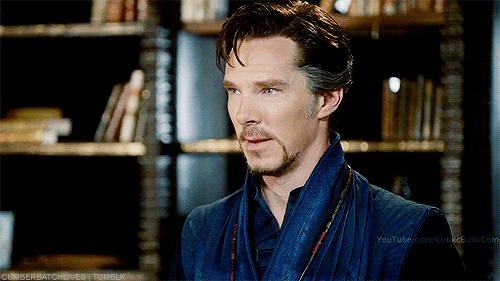

You smiled at Stephen when he looked at you. It was borderline staring but you didn't mind it. He was kind, sweet, and funny. You remembered when he started to let loose around you by telling a joke. You loved the way he smiled when you laughed at it. Since then the two of you relaxed around each other during this project. You had only hoped that once it was done, you would still be able to stop by and see him.
The day finally came and the project was done. You were in the library, packing your things when Stephen stormed into the library. "Don't leave." He said finally making his way to you. You stopped and looked up at him, realizing how close he was to you. Your cheeks turned red and your lips parted so delicately. "What's wrong?" You said softly.
Stephen cupped your face in his hands and gazed at you lovingly. "I can't imagine a life without you." He whispered and your heart skipped a beat.
"Are you alright? A-Are you running a fever?" You moved your hand to touch his forehead.
Stephen shook his head and smiled, "I've never been this alright in my whole life." Stephen gently rested his forehead against yours and stroked your cheeks with his thumb. "May I kiss you?" He asked softly. You responded by kissing his lips softly and wrapping your arms around his shoulders. Stephen held you close as he returned the kiss.
When you two finally pulled away, he smiled sweetly at you. "Stay with me." He begged.
You gave him a gentle smile and nodded, "I think I have to now." Stephen chuckled softly at your joke and you pecked his cheek.
"You have my heart," Stephen said to you as he leaned in for another kiss.

Tagging:@deepbatched, @vikingqueen28, @leonkennedyslefthand, @stewardofningishzida, @icytrickster17, @onlinecemetery, @marki-moo0, @absolute-not-original, @creamecafe, @scrubb, @nightingal3-tales, @alliethedaydreamer, @strangesthirdeye, @alexa-33, @zombiedixon89, @sunnsettee, @deliciousfestsalad, @kiaradaniell, @freyafriggafrey, @criticalroleobssedperson, @avengersfan25, @lunamoonbby, @androgynouspersonapricotfan, @foxcantswim, @namorkawaiiwife, @starkiller-queen, @kyuupidwrites, @luciamajer, @renatas10, @ayamenimthiriel, @gaiagurl05, @dipsylou, @pinkthick, @hansai, @andywinter16, @iambored24601, @3-cheese-tortellini, @cumbrbatchbenedict, @ironstrange1991, @aribas-stuff, @rianumochi, @vibaracal, @lostpirateinwonderland
23 notes
·
View notes
Text
SCoR - Section II, Ch. 1, Part D "Roles"
summary of “The Social Construction of Reality” by Berger and Luckmann
I. As seen previously, institutional order arises out of mutual typifications of action. This implies that certain actions, goals, forms, etc. are shared with others and mutually comprehensible: "as an X, I do Y; if you do Y, you must be an X."
II. To be typified, there must be objectivations; to be objectivated, there must be linguistic structures describing the typifications.
III. These typifications then structure self-experience: "When I am doing Y, I am an X." As people can have many such roles, more and more of self-consciousness is structured in terms of these typifications; the self becomes a social self.
IV. Because these typifications can be assumed and exited, they can be - and are - apprehended AS types, and the acting individuals seen as (potentially) separate from the typifications they enact.
V. "We can properly begin to speak of roles when this kind of typification occurs in the context of an objectified stock of knowledge common to a collectivity of actors. Roles are types of actors (actions?) in such a context."
VI. Standards of role performance are available broadly to members of a culture, more particularly to potential actors of that role. This allows actors to be held accountable for abiding by these standards.
VII. "Roles appear as soon as a common stock of knowledge … is in the process of formation, a process … endemic to social interaction and prior to institutionalization proper."
VIII. Roles represent the institutional order in two ways: performance of the role represents itself, and additionally, an entire institutional nexus of conduct - relations with other roles which represent the institution entire. Enacting roles is what makes institutions real in people's lives.
IX. Other representations - in symbol, in word, etc. - are subordinate to role enactment. The symbol is dead unless it lives in human action.
X. Some roles symbolically represent the institutional order more powerfully than others: the judge compared to the clerk, the president compared to the aide, etc. These roles thus also serve an integrative purpose, holding the institution together.
XI. Roles also serve to integrated/structure much (inward) knowledge of society not immediately relevant to the outward performance of the role.
XII. A society's stock of knowledge is thus distributed among its members according to differing scopes of relevance: more, or less, universal/broad.
XIII. Division of labor means specific roles are created/defined more frequently than general ones, so in turn, role-specific knowledge is accumulated faster than general knowledge in a given society.
XIV. In turn, accumulating role-specific knowledge means a society must be organized to support specialization.
XV. The "typology" of specialists then becomes an important part of the common stock of social knowledge.
XVI. Thus we see two perspectives on roles and knowledge:
Institutional order: roles are institutional building blocks and embody institutionally objectivated bodies of knowledge
Roles: institutions exist only as embodied in actors enacting certain roles associated with those institutions.
XVII. Roles and their definitions thus mediate between the self and society.
----
Notes:
re: IV - total identification with one role - eg. Daniel Day-Lewis as an actor, or fictional characters (magnus in 'the octopus', the judge in Babylon Berlin s4) - what purpose does this exaggeration serve? there is a read where there is no 'you' other than the roles you embody
re: VI - pygmalion/my fair lady - plot is all about the enacting of roles, "if you can do 'it' well enough, then you ARE 'it' whatever 'it' may be" - eliza is trained up to be a lady, and later feels 'ruined' for her previous life. same with her father, tho in a different way. higgins as a social "philosopher's stone" transmuting low to high?
re: XII - the authors say there's a "dichotomization" of knowledge between general and role-specific, but this seems wrong - knowledge inheres to roles, so the ROLES may be more or less specific: "i am an american" vs. "i am an engineer" vs. "i am myself" but the knowledge is ALWAYS "role specific"
re: XIII:
a. this is as close to a concrete mathematical relationship as I've seen expressed thus far
b. knowledge and role genesis concept; refer back to part B "origins of institutionalization" for something similar. TODO: figure out how to recreate the diagram I drew in my paper notes
#the social construction of reality#sociology#knowledge#roles#the octopus#my fair lady#babylon berlin#pygmalion
0 notes
Photo

I wanted to practice drawing HHP since I’m still not very good at capturing his likeness, so here’s a close up based on My Fair Lady’s final scene.
Totally didn’t spend the whole night working on this instead of sleeping haha
#my fair lady#my fair lady 2018#henry higgins#harry hadden-paton#eliza x higgins#sorta#might make a companion piece of eliza but that would depend on how motivated I'm feeling#I swear I've gotten worse at drawing HHP over the years ack#I might redraw this sometime later#bottle cap doodles#bottle cap doolittles
23 notes
·
View notes
Photo



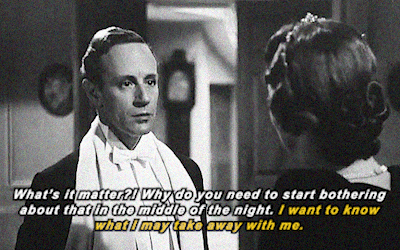
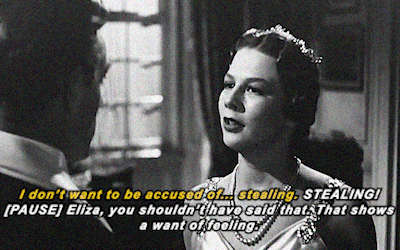
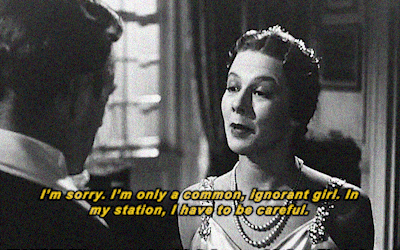
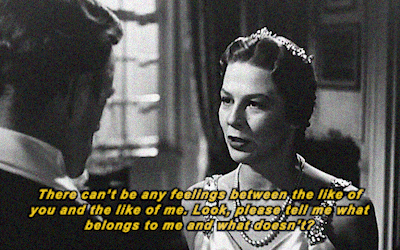
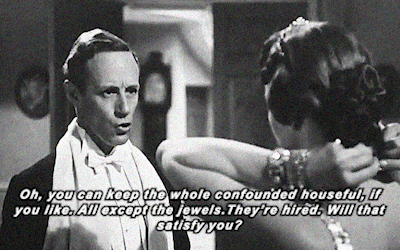
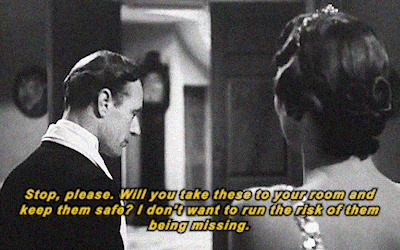

"This ring... [pause] it isn't the jewellers. It's the one you bought me in Brighton. I don't want it now.
DON'T YOU HIT ME! HIT YOU, YOU INFAMOUS CREATURE! HOW DARE YOU ACCUSE ME OF SUCH A THING! It is you that have hit me. You have wounded me to the heart."
LESLIE HOWARD (Henry Higgins) and WENDY HILLER (Eliza Doolittle) in Pygmalion (1938) | dir. Anthony Asquith
#1930's cinema#1930s#1938#pygmalion#henry higgins#eliza doolittle#henry x eliza#my fair lady#bernard shaw#leslie howard#wendy hiller#anthony asquith#british cinema#united kingdom#filmblr#classicfilmsource#filmedit#romanceedit#dramaedit#my gifs
55 notes
·
View notes
Text
My Fair Lady is one of my favourite shows (I first saw it when I was about 3 and there is photographic evidence of me dressing up as Eliza and dancing around singing "I could have danced all night" from about that age; not much has changed) and I saw it in London last night, first professional production.
I have mixed feelings about the production tbh but it's made me think about how MFL really is very confused about what it's trying to say and do as a show and how it's presenting its central relationship between Higgins and Eliza. I've always been a shameless Henry/Eliza shipper (don't worry - I've been told off about this quite enough, thank you!!) but they're definitely problematic. Or maybe it was just this production in which I didn't really know what they were trying to achieve.
The first problem is Henry being a raging misogynist. He doesn't really change. He comes to understand how important Eliza is to him by the end of the show and we certainly understand his perspective more and see aspects of its validity - that he treats everyone the same, his genuine belief in speech as a way to level class distinctions, and so on. But still by the end he never really faces up to what his feelings for Eliza mean - as can obviously be seen in the very fact that "I've grown accustomed to her face" is famously a love song without the word love in it. Henry is not yet ready to admit he is in love with Eliza or deal with the cataclysmically life-shifting implications of that. The fact that what he says to Eliza at the end of the show is "What the devil have you done with my slippers?" proves that he has not yet changed. Not that he is incapable of change but he is not yet there.
There's also the fact that he can be really quite unpleasant and that has to be shown for absurdity or it just makes him ultra dislikeable. His first song "I'm an ordinary man" is deeply uncomfortable if played straight. My mother once said that the only time she could deal with that song and didn't actively dislike the show was when she watched my school production and Henry was played by a teenage girl. That casting alone showed all the absurdity of his position and the song, but productions with an adult male Henry have to do that as well. It also means that we actually need Henry to be completely ruined by the end of the show. He... kind of has to be completely head over heels in love with Eliza! If he wins, if he is allowed to continue smugly in his existence, not really changing, then it's deeply unsatisfactory. Not to go too Aristotelian on you all, but he needs some serious peripeteia going on for the audience to be invested in him. If he starts the show with deeply unpleasant and absurd misogynistic ideas then all of this needs to be completely and utterly destroyed by the end. He needs to be absolutely laid low by Eliza and her victory over him. But a lot of productions don't push Henry so far and the script itself and its ending don't help.
I thought the London 2022 production actually did Henry really well, played by Harry Hadden-Paton. They made him young, which was excellent. Young men can be pedantic misogynists as much as old ones! And it made his romantic feelings towards Eliza much more palatable. He played the development of his feelings very naturally. Perhaps I was reading too much into it, but at the beginning around "I'm an ordinary man" he almost came off as defensive and alone, using extreme views about women to hide his inability to understand or deal with women. I felt that was a really interpretation and I wish they'd pushed it further and makes much more sense if Henry's younger and inexperienced than in an older man. (More could have been done with Pickering and his reactions, but that's another story.) Later on, there are a few moments when he clearly has a physical interest in Eliza but doesn't quite know what to do about it- subtle, but present. And he's clearly bowled over by her appearance before the ball. The best moment was in his confrontation in his mother's greenhouse where Eliza says she isn't interested in him romantically "and that's just how you feel about me" and he's like "uh, yes, definitely". It got a laugh. I loved that. This production realised Henry had to be fully in love with Eliza for it to be satisfying and also that he had to be destroyed by it, which is the ending worked, in which he was left alone to grapple with his defeat.
But while Henry on his own was masterful, Eliza was problematic. What does Eliza feel? The script is so contradictory! Eliza is attracted to Henry. "I could have danced all night" spells this out. And this production gave her a delightful moment during "The rain in Spain" where she touched her heart in surprise after dancing with Henry and didn't have time to think about it before Henry is sweeping her off again, denying Pickering a chance to dance with her because he wants to. Very nicely done. And fine. We watch Eliza's growing feelings and her deep frustration because Henry is incapable of reciprocating in any kind of sensible way. But then what to do with what she says to Henry in the greenhouse? She very clearly spells out that she isn't interested in him romantically but "more friendly-like". But that really isn't justified by what the text says previously or her utter disdain for Freddy. (I always think it would be interesting to play "Words words words" as being really addressed to Henry and Freddy just happens to be there.) Either Eliza is in denial about her feelings about Henry or she is determined to squash them because he's so annoying (valid) or she's really got over them, as suggested in "Without you" ("What a fool I was,what a dominated fool, to think you were the earth and sky!"). But if she actually has got over him then WHY DOES SHE GO BACK TO HIM AT THE END? It makes no sense. You see why I find the script itself problematic and contradictory? This production played it as if she was acknowledging his feelings but saying a proper goodbye which was an interesting and not awful decision, but it rang a bit hollow. Why would she do that if she really didn't need him and was as done with him as was suggested in the previous scene? But if you play it as if Eliza was returning to him properly, then it's also unsatisfactory because he hasn't changed properly and she's just said she can stand on her own. They're not there yet!
The best production I saw was a student production in Cambridge when they just went hard on the romance. They conveyed subtext and longing and ended with a passionate kiss when she came back. It worked because they built a completely convincing counter narrative running underneath the script. But I felt like this production didn't quite know what it was doing, mainly with Eliza's feelings.
I suppose the good thing is that I now really want to write post-show fanfiction with torturously slow burn that allows both Henry and Eliza to grow fully as the production teased but the show never allowed them to rise to.
I'll always love My Fair Lady but damn, it's a deceptively tricky show.
41 notes
·
View notes
Text

I apologize in advance.
#pygmalion#henry higgins#professor higgins#eliza doolittle#elizabeth x darcy#darcy x elizabeth#pride and prejudice#mr darcy#mr. darcy#elizabeth bennett#elizabeth bennet#sense and sensibility#colonel brandon#marianne dashwood
71 notes
·
View notes
Text
Fanfic Advent Calendar 2022

open the door for December 12th
1 note
·
View note
Photo

AU: Freya Mikaelson, an uneducated young woman living in the streets and selling flowers just to make ends meet, is taken in by phonetics professor Lucien Castle and his colleague, Tristan de Martel, who teach her manners and proper English. Although Freya hates Lucien at first due to his cold attitude, they begin to bond from her lessons. Despite Freya eventually leaving him due to him using her as a bet to make her a proper lady, she returns following both of their realizations that they couldn't live without each other, and the two live happily together.
#frucien#freya mikaelson#lucien castle#freya x lucien#the originals#pygmalion#my fair lady#professor higgins#henry higgins#eliza doolittle#colonel pickering#my otp as student and teacher#my edit#au
4 notes
·
View notes